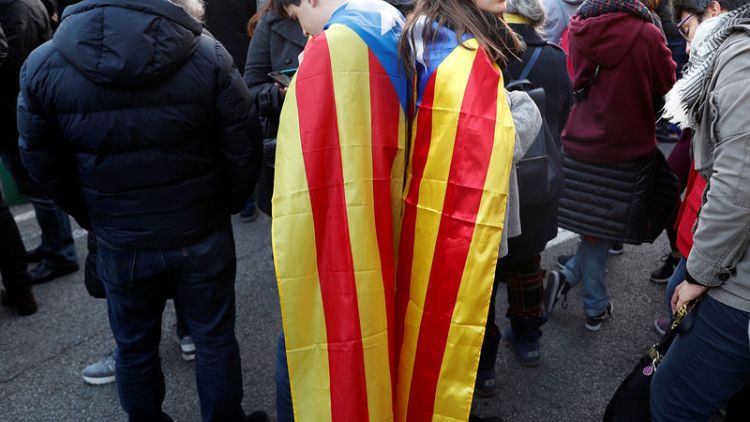By Sam Edwards and Ingrid Melander
BARCELONA/MADRID (Reuters) - Cheers rang out and drinks flowed in a Barcelona sports hall on Sunday night as separatists celebrated a victory - the first time a pro-independence party won in Catalonia in a national election since Spain's return to democracy.
Esquerra Republicana de Catalunya (ERC) supporters also took heart from the national swing to the Socialist Party of Prime Minister Pedro Sanchez, less hostile to their cause than right-wing parties.
After years of political deadlock, the stars finally seemed aligned. But Sanchez may in fact have done rather too well for the pro-independence camp's liking.
"Sanchez's options of partners are higher than in the past legislature, and that diminishes the influence that the Catalans can have," said Antonio Barroso, managing director of political consultancy Teneo.
"The ability of the Catalans to push their agenda forward is a direct function of how much depends on them in parliament."
Separatist lawmakers had brought down Sanchez's minority government in February when they refused to back his budget, triggering Sunday's snap national election and placing Catalan independence at the heart of a tense election campaign that was dominated by issues of national identity.
While ruling out any rerun of the Catalan independence referendum that in 2017 triggered Spain's worst political crisis in decades, Sanchez has said he is open to dialogue with the separatists, and he still needs allies to form his next government.
ERC got the biggest share of the vote in Catalonia and, in total, a record number of pro-independence Catalans will sit in Spain's new parliament.
But the Socialists numbers' are also up - by nearly 50 percent to 123 seats - and Sanchez's party has made clear it is not about to rush back into the separatists' arms.
"We said we weren't going to entertain ... (a pact) and we won't," Socialist party secretary Jose Luis Abalos told Telecinco TV.
As the festive atmosphere in the wealthy northeastern region faded, so did election partygoers' expectations of an early end to years of political deadlock between Barcelona and Madrid.
"There is always hope that something can be achieved, but I don't know. I'm doubtful," 50-year-old care worker Anna said at the ERC rally, already checking her enthusiasm.
"I imagine the Socialists may look elsewhere and leave us on the ice."
A MISTAKE?
Catalonia's 2017 referendum, staged by its separatist government though banned by Spanish courts, was broken up on Madrid's orders, leading to scenes of violence that grabbed worldwide attention.
Catalonia accounts for nearly 25 percent of output in the euro zone's fourth-largest economy and at the height of the crisis, when it briefly declared independence, the euro sank and more than 3,000 firms moved their headquarters outside the region.
ERC, which won 15 seats on Sunday, is already pressing Sanchez to open talks on demands for another referendum and the release of separatist leaders jailed pending trial for their role in the 2017 vote.
But months of brinkmanship lie ahead, with no guarantee that they and a second secessionist party, Junts per Catalunya (JxCat) with seven seats, will get much of what they want regarding a referendum or any move towards independence.
What Sanchez is open to is giving Catalonia more autonomy. Although he has given no details, there could be margin of manoeuvre there, and the separatists could also hope to get more funds for their region.
ERC lawmaker Gabriel Rufian called on Monday for the Socialists to "bring politics back to this political conflict and remove judicial robes and police batons".
But if Sanchez gets backing from far-left Podemos, which has suggested coalition talks, and from Basque nationalists, he would need the vote, or abstention, of only one other lawmaker to form a government with a parliamentary majority.
Sanchez is now in such a strong position that some separatists regret that their camp triggered the election, including ex-lawmaker Carles Campuzano, who said secessionist deputies had had "decisive weight".
"If we lose it, it would be the result of our mistake in forcing the snap election," Campuzano told Reuters. He had been sidelined by hardliners in his own party for advocating greater flexibility in negotiations with Sanchez.
HARD QUESTIONS AT HOME
Having lost their majority in the regional parliament, Catalan nationalist parties also face hard questions from voters at home, where anti-austerity protests broke out last year.
They also failed to pass this year's Catalan budget and are dogged by internal divisions.
Tensions could reignite as soon as the new national parliament is convened or subsequently when a Spanish court hands down its sentences on the jailed separatist leaders.
Five of them were elected to the lower or upper house of parliament on Sunday and it is unclear if or how they will be able to fulfil their new roles.
Sunday's vote was a triumph for left-wing ERC, which has been more open to compromise with Madrid than the more hardline, right-wing JxCat, which lost seats.
It is also unclear whether divisions between those two parties will widen following Sunday's events, but there remains a sizeable core of voters who want nothing less than independence.
"I want a referendum,", Joan Rotllan, a 51-year-old JxCat voter, said at a rally on Sunday against the backdrop of a giant yellow ribbon signalling support for the jailed leaders.
(Additional reporting by Joan Faus in Barcelona and Belen Carreno in Madrid; Writing by Ingrid Melander; Editing by Mark Bendeich and John Stonestreet)
